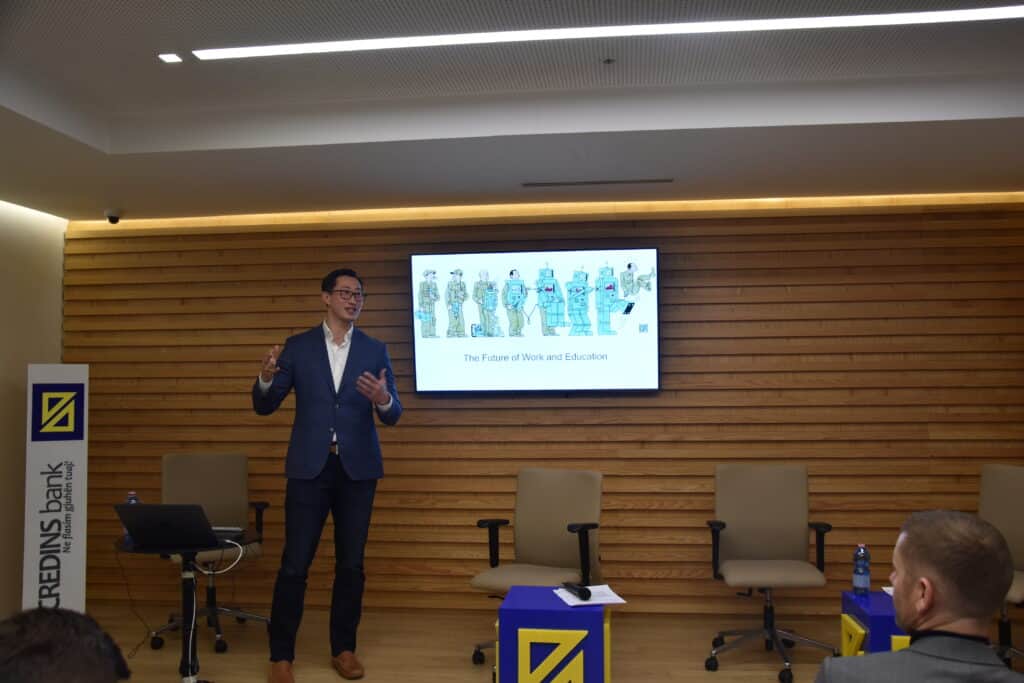Upskilling and retraining the workforce for post-pandemic realities



The American Chamber of Commerce in Albania brought together a panel of experts, including Richard Wang, CEO of Coding Dojo, a Silicon Valley-based global academy of technology education, to hold an open discussion on workforce retraining to meet new digital trends. The meeting focused on an analysis of recent global developments that have had an impact on Albania’s economy and how all market actors should invest in training the workforce with information technology skills in order to adapt to a radically changed post-pandemic labor market.
In its efforts to improve the business climate in Albania, AmCham sees upskilling the workforce to meet new digital demands as a priority and has included specific recommendations on the matter for the government. These recommendations have become part of the agenda of AmCham’s Digital Business Committee, which hosted this latest event as part of that program.
“An analysis of the facts tells us that we do not have a digitalized economic environment, and we do not have a skilled workforce for that process. But this does not mean that the talent is not there; we just have to work to guide and train it,” AmCham Albania President Enio Jaço said at the meeting, recalling data that shows that in the regional race for coders, Albania remains last with just 2 coders per 1,000 inhabitants, while Serbia has 9 coders per 1,000 inhabitants.
AmCham Executive Director Neritan Mullaj added: “One of the recommendations made by AmCham in its Investment Agenda is developing 100,000 coders.”
That need was addressed by several of the panelists who brought their experiences and opinions on how the workforce can be trained to deal with innovations in information technology.
Coding Dojo is an educational institution that operates in 32 countries around the world, and its CEO, Mr. Wang, explained at the meeting how it offers genuine platforms and expertise in training the workforce on the latest information technology trends. Employees that are looking to acquire the knowledge do not necessarily need mathematical and engineering skills. They need logic and dedication, he said.
Explaining the development trends and the upskilling of the labor force, Mr. Wang focused on the changes happening to the labor market and many professions in the new post-endemic reality. There is an entire class of mid-skilled workers that is disappearing as a result of the automation of work processes, creating a large gap between the low-skilled and high-skilled workforce. The challenge is to guide the workforce by equipping it with knowledge and skills to adapt to the new structure of professions in the market. Thus, according to a study by Coding Dojo, the jobs that stand at the top of the list in this new post-pandemic world are those that are tied to computer sciences, web development, product management, data analytics and cyber security.
AmCham experts at the panel, representing companies operating in the education, digital and innovation arenas, held a discussion with Mr. Wang on how to adapt to the changes that the Albanian and regional markets are experiencing and the resulting challenges to be faced.
“Think globally and work locally” — is the motto that Linda Shomo, CEO of Easy Pay and Vice Chair of the AmCham Digital Business Committee noted, pointing out that global developments should show Albania how to adapt, paying due attention to legislation on digital developments and workforce training. The representative of the Holberton School, Grant Van Cleve, explained that programs at his institution are trying to create a generation of young people who will adapt their skills to the market by getting the right knowledge in the fields of coding and information technology.
Olindo Shehu, managing partner at Deloitte CE South, said that maybe 100,000 might not just be from within the country, but the preparation of proper legislation will make the market interesting for coders from other countries too. “Today we need not only people who process data but also people who tell us the story behind the data and help managers build a strategy,” Mr. Shehu said in his input to the discussion on the development of the workforce.
All participants at the event shared a common denominator about the importance of all market actors working together to make possible the retraining and upskilling of the capable workforce in order to meet the new challenges of the labor market.

